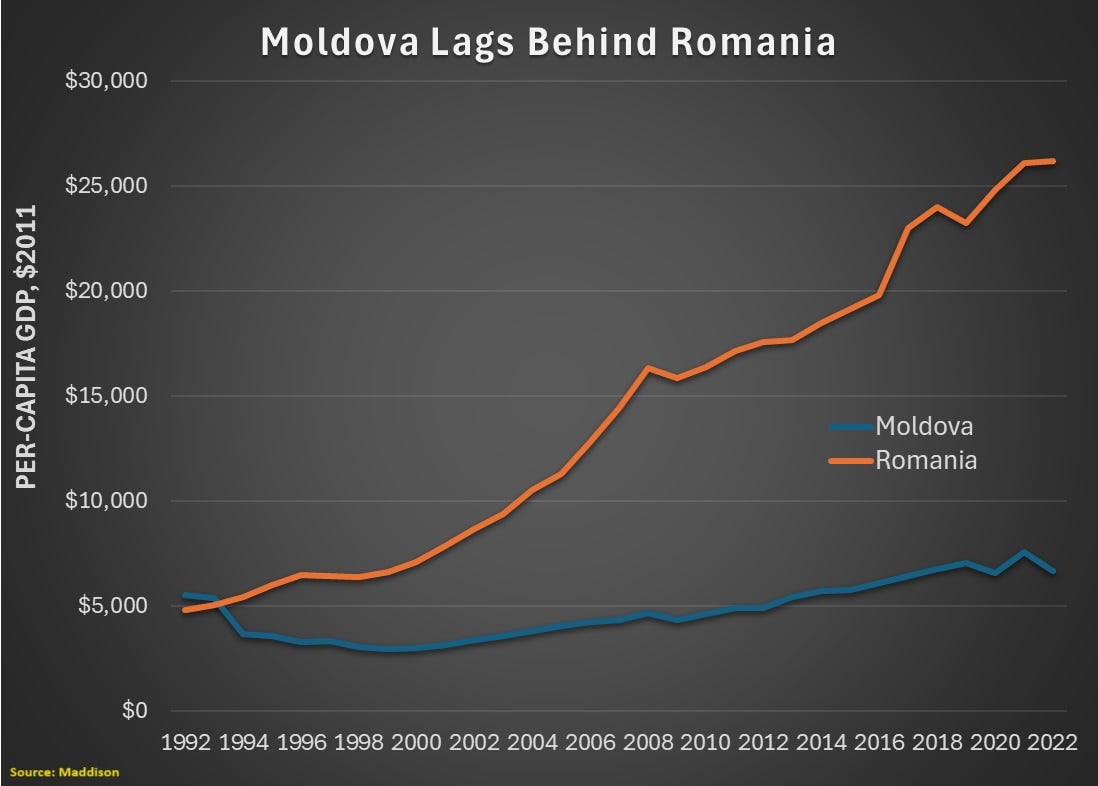The Case Against Foreign Aid
Proponents of foreign aid say it can help lift countries out of poverty, but the evidence tells a different story.
The main argument in favor of foreign aid is that rich countries can and should help poor countries become more prosperous. And plenty of politicians are following that approach. According to the latest data from the Organization for Economic Cooperation and Development, donor governments gave away more than $220 billion last year. But advocates of foreign aid say that’s not enough. The folks at the United Nations assert that rich countries should double their foreign aid budgets.
Skeptics of aid have a different perspective. They explain that foreign aid is not successful and that increasing aid budgets would be throwing good money after bad. They argue that foreign aid is wrong in theory since it focuses on giving money to governments rather than the pro-market policy reforms that would boost growth. And they argue that foreign aid has failed the real-world test since countries receiving large transfers have not climbed out of poverty.
For those who care about evidence, the skeptics have a stronger argument. Not only is there no evidence that foreign aid has ever turned a poor country into a rich country; it is much more likely that foreign aid undermines economic development by giving politicians in recipient nations an excuse to delay or avoid needed reforms. For instance, the latest report from the United Nations’ Economic and Social Council shows that developing nations are regressing rather than progressing in meeting development goals.
The World Bank has a comprehensive database showing how much foreign aid various jurisdictions have received since 1960. It shows that poor nations have received $4 trillion over the past six-plus decades, a staggering sum of money. If government-to-government transfers were good for prosperity, the nations that have received the most aid should show very strong results. Yet those countries are still mired in poverty. Politicians in recipient nations have become rich, but the people have remained poor.
Incidentally, the US Agency for International Development claims that South Korea and Taiwan show that foreign aid can be successful. Yet a report from the Cato Institute noted that “those countries began to take off economically only after massive US aid was cut off.”
Let’s look at Moldova and Romania for an apples-to-apples case study, since the two countries are next to each other and share a common ancestry. Moldova is an economic laggard. It is the poorest nation in Europe other than Kosovo and war-ravaged Ukraine, with per capita economic output lower than nations such as Libya, Ecuador, and Botswana. The country has experienced very little real (inflation-adjusted) growth since breaking free from the Soviet Union about three decades ago.
Romania also was very poor when it was part of the Soviet Empire. Yet look at what has happened to per capita GDP in Romania over the past three decades. As shown in the chart, Romanians’ living standards have dramatically increased, while Moldovans’ have remained stagnant:
What accounts for the vastly different economic outcomes in Moldova and Romania? The answer in large part is that there are significant differences in economic policy. Romania has shifted toward capitalism, while Moldova is plagued by statism.
According to the Fraser Institute’s Economic Freedom of the World report, Moldova is ranked #57 while Romania is ranked #27. The Heritage Foundation’s Index of Economic Freedom also shows Romania with significantly better economic policy than Moldova. Except both countries rank lower with Heritage than with Fraser, with Romania coming in at a mediocre #51 and Moldova trailing with a dismal #99.
Now let’s bring foreign aid into the analysis. According to the World Bank data, Moldova has received more than $7.8 billion of aid over the past three decades (one of the world’s biggest recipients on a per capita basis). Romania, however, has only received $5.6 billion. And since Romania has 19 million people compared to Moldova’s 2.5 million, per capita handouts to Moldova have been immensely larger.
Yet has all that aid helped Moldova grow faster than Romania? No.
Has all that aid helped Moldova keep pace with Romania? No.
In all likelihood, the handouts to Moldova have probably led to less growth. Why? Because politicians have less incentive to fix problems when they can simply put their hands out for freebies.
By the way, there is no reason to think that European Union membership is responsible for Romania’s comparatively strong performance. EU membership (phased in between 2004–2007) did not alter the nation’s long-run growth rate.
To conclude, government-to-government aid could play a productive role if there was conditionality. If the United States government and other aid agencies around the world made aid contingent on big improvements in economic policy, that would result in more prosperity for Moldova. Sadly, donor governments are tragically uninterested in imposing good conditions on aid. And recipient governments only care about keeping the aid spigots open so that politicians and senior bureaucrats can pocket a big share of the loot.
Daniel Mitchell is the President of the Center for Freedom and Prosperity. This column summarizes some of the findings from a recently published study.
In the Art of Liberty Foundation’s book: “Government” – The Biggest Scam in History… Exposed! We break down how “Government” is best thought of as a technique for robbing and controlling populations. The book also exposes how an inter-generational organized crime system has been controlling the information the population receives about the legitimacy, necessity and desirability about “government” using mandatory “government” schools, scouting, Explorers, JROTC, ROTC, police and military training, monopoly media, propaganda woven into Hollywood films and television shows, and the algorithmic censorship of the internet.
The indoctrination and propaganda have been so successful that many people have never been exposed to the alternative to top-down “government” control.
They falsely believe that voting in rigged elections for the lesser evil is their only choice.
On November 1st-3rd, The Art of Liberty Foundation will be hosting Liberty on the Rocks – Sedona – The Voluntaryism Conference.
Discover the option that is NEVER offered or discussed by the MainStreamMedia or the MainStream Alternative Media: REAL FREEDOM!
We don’t really need “Government!”
All the legitimate services provided by monopoly “government” would be better provided by the free market, mutual aid societies, armed protective service companies, arbitration providers, insurance companies, and genuine charities.
Without the government’s mandatory inflationary money and confiscatory taxation, the economy would prosper and the population would be much wealthier and better able to help the poor, needy and disadvantaged.
Come join some of the country’s leading economists, legal experts and political philosophers discuss how the world could have more harmony and prosperity without “government”
Sedona.ArtOfLiberty.org - In-Person or Virtual – November 1st-3rd
Go Paid on Substack @ the $50 a Year Level and get a Free Ticket to the Liberty on the Rocks virtual conference and a free softcover copy of Etienne’s new book: Voluntaryism – How the Only “ISM” Fair for Everyone Leads to Harmony, Prosperity and Good Karma for All when released in November.
Go Paid at the $250 a Year Founding Member Level and get a free in-person ticket to Liberty on the Rocks in Sedona and a signed copy of the “Swiss Flip” version of Voluntaryism AND “Government” when released in November.








The case against huemanity!!!
Pardon my ignorance, but where is the discussion of the habitual mafia tactic of offering nations foreign aid that comes with conditions and encourages dependence? Such as take out a huge loan from the IMF, limit all of your nation's productivity to a commodity that the US wants, and export it to US at cheap prices (enriching us not you), import your basic needs from the US (enriching us not you), and if you do not follow orders from the US, we will pull the rug out from under you. A la Confessions of an Economic Hit Man? Don't we do that to every nation who receives foreign aid or are we selective? I was surprised that pattern was not mentioned here.